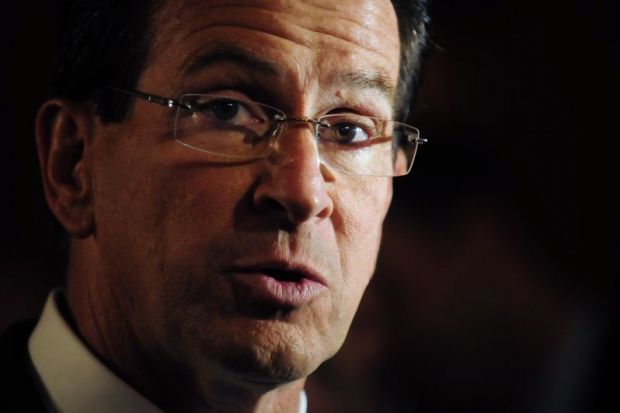Having fought protracted campaigns to consolidate two different US public university systems confronting shrinking demand, Dannel Malloy is battle-scarred but sympathetic towards the people fighting him from within.
Mr Malloy is currently chancellor of the University of Maine system, and perhaps barely so, after faculty senates at four of his campuses passed votes of no confidence in his leadership.
Yet the former governor of Connecticut – a state where he previously created resentment over organisational mergers – said he understood that the processes rippling across the US can be emotionally difficult for many involved.
“It’s really trying to get universities in the same system to work more closely together so that everybody can survive in what are very difficult situations,” Mr Malloy said in an interview. “These are difficult times. There is a lot of pressure to make change, to survive. And there’s sometimes just misunderstandings that arise.”
Maine and Connecticut are among several US states where population declines are forcing higher education leaders to at least consider, if not enact, plans for greater organisational efficiency.
In the case of Maine, Mr Malloy in 2020 moved its entire eight-campus system into a unified entity with a single accreditation. Back in Connecticut, he oversaw a similar move with four universities and 12 community colleges, putting them under the control of a single board of regents.
Other states taking such steps include Pennsylvania, which recently consolidated six of its public institutions in rural areas into two accredited units, and Georgia, which over the past 15 years has cut its system down from 35 institutions to 26.
For many, the idea offers some obvious benefits. In Maine, Mr Malloy told Times Higher Education, some of the eight campuses have been left with only 800 or 1,000 students. The lack of faculty and courses at such small locations, Mr Malloy said, can leave some students waiting a full extra semester just to complete their degrees.
“That’s just bad policy,” he said. “We seek to avoid that for all of our students.”
Consolidation, however, often generates internal opposition, as faculty fear losses of jobs and quality. In Maine, faculty at the University of Southern Maine, and at the University of Maine campuses at Augusta, Farmington and Machias, all endorsed no-confidence votes against Mr Malloy.
Those votes came just ahead of Mr Malloy’s three-year job review by an outside firm, and an assessment by the University of Maine trustees of what to do about it.
The question facing the system-wide trustees was further complicated by the situation at the University of Maine at Augusta, for which the trustees recently voted to name Michael Laliberte – the president of the State University of New York at Delhi – as Augusta’s new president. Dr Laliberte then withdrew from the Augusta post after it became known that he had faced two no-confidence votes by faculty during his time at Delhi.
Mr Malloy took the blame for the situation, saying he had accepted the advice of an outside search firm that he keep quiet about the no-confidence votes against Dr Laliberte. “Bad advice was given, and bad advice was taken,” Mr Malloy told THE, “and unfortunately, I’m the person who followed the bad advice from a firm that wanted to handle a particular issue one way.”
Either way, the Maine trustees appear to have forgiven Mr Malloy and – after receiving this three-year job review – left him to remain in charge of the 33,000-student system. And Mr Malloy has repeatedly offered words of regret for the Laliberte case and for any shortfalls in his handling of the consolidation process.
“What I have an appreciation for is that change is very hard to make,” he said in the interview. “No matter where you stand on it, it’s either happening too slowly or too fast.”




